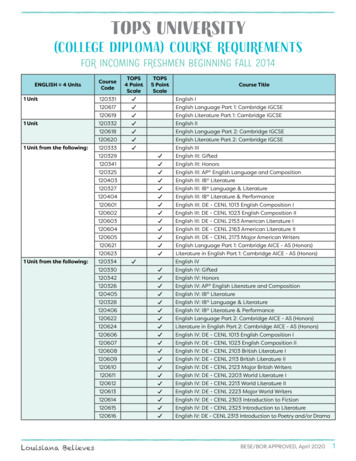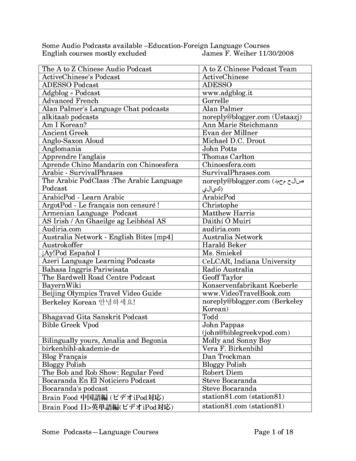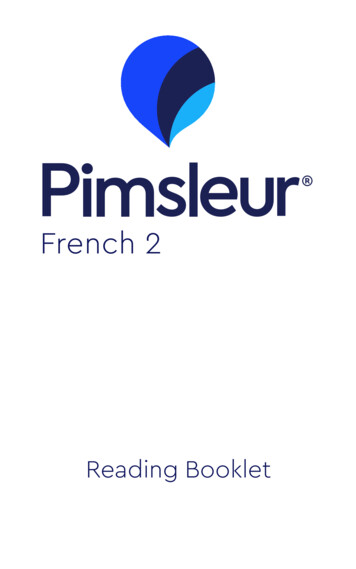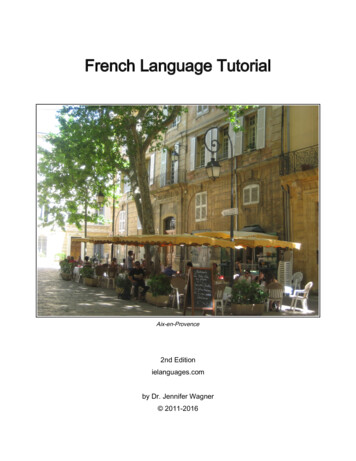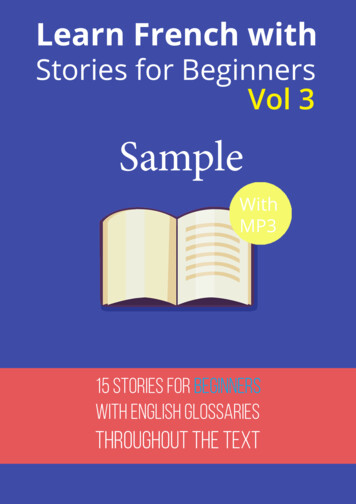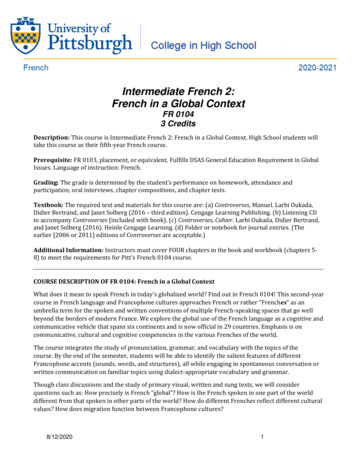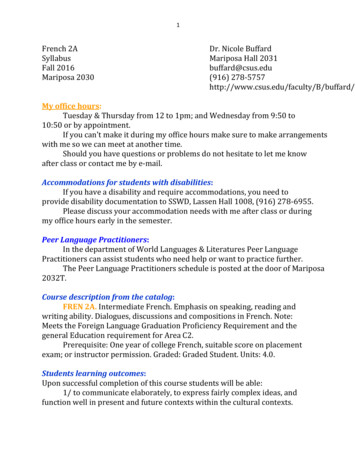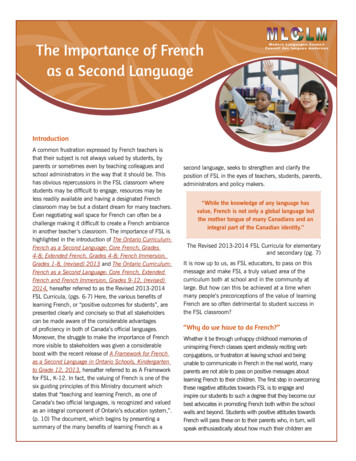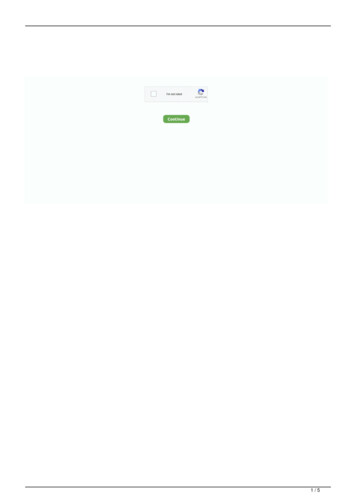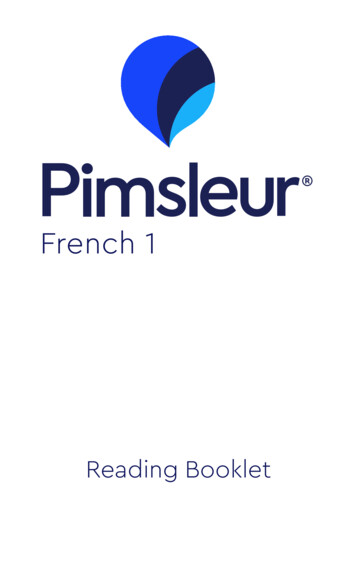
Transcription
FrenchHow you can succeed in your Junior Cycle FrenchCBAby Emer HallisseyEmer Hallissey is an experienced teacher of French. Here she shares her hints and tips forsucceeding in the Junior Cycle French CBA.
Table of ContentsINTRODUCTION. 3CBA 1 . 4CBA 2 . 7ASSESSMENT TASK . 9DOS AND DON’TS . 11Page 2
IntroductionOver the course of Junior Cycle French you will need to complete two ClassroomBased Assessments (CBA). There is a unique grading system for the CBA, where youwill receive a descriptor for your work from your teacher. The descriptors include“yet to meet expectations”, “in line with expectations”, “above expectations”, and“exceptional”. These CBA descriptors do not contribute to your final grade, howeverthey will be added to your Junior Cycle Profile of Achievement. Also, CBA 2 is linkedto your Assessment Task which is worth 10% of your overall grade.Putting grades and descriptors aside, the CBAs are important learning opportunitiesthat will set you up with important skills for Senior Cycle – French and futurelanguage learning. Therefore, you should give it your best shot. In 2nd year, you willcomplete the CBA 1 which assesses your Oral Communication (how well you speakFrench). In 3rd year, CBA 2 gets you to review your language learning by reviewingyour language portfolio (made up of examples of work from 2nd and 3rd year) andwriting a reflection on your work. Following on from CBA 2, you will complete yourAssessment Task.This guide will give you a better understanding of what is expected of you during theCBAs and Assessment Task. The guide is laid out clearly to help you find informationquickly. This guide also includes suggestions and recommendations on how to canachieve your best result for each CBA.Page 3
Classroom-Based Assessment 1 - OralCommunicationThe purpose of this CBA is to develop and improve your ability to speak French andto communicate information clearly through French. This is an important part of yourlanguage learning as languages are meant to be spoken. From this CBA, you shouldlearn/improve the following skills: Pronunciation – Can you say words correctly in French? Clear communication – Did my teacher and classmates understand what Iwas talking about? Language – Was my grammar generally correct and did I use lots of differentvocabulary.The CBA 1 allows you to work towards many of our Learning Intentions such as;1.9 Pronounce words accurately enough to be understood, with appropriateintonation.1.10 Convey simple descriptions, presentations, or announcements on familiartopics.2.2 Apply all language learning to creative activities such as producing simplepoems, posters, presentations, games, and drama.3.7 Analyse similarities and differences in relation to their peers’ lives in the targetlanguage country/countries in areas of daily life and present them using a range ofmedia.Page 4
You may have to do one of the following tasks: An interview A role-play A presentation followed by a question and answer. A conversation in response to stimulus (something).You might choose from this list yourself or your teacher might decide for you. Youmay work on your own or in pairs or in groups. Again, this may be your decision, oryour teacher might decide. You will be expected to speak in French for 3-4 minutes.Even if in a group, it is important that you are able to show that you did your part. Atthe end you will need to write a reflection on what you learned from this CBA.Getting started and preparing for CBA 1No matter what you're doing for your CBA, you will need to plan and be prepared.Think about which task you're doing and brainstorm what you need to do. If yourteacher has given you a theme or framework, read this very carefully and makenotes. Don’t be afraid to ask your teacher questions and for advice. If your teacherhas given you complete freedom, work on a topic which interests you e.g. I lovefootball, so I will pretend to interview my favourite footballer. You will need toresearch your topic and look up some new vocabulary. Of course, you need to writeout what you plan to say. Be aware that you may need to rewrite and redo parts ofyour CBA. The more preparation that you do at this stage, the easier it will be.Page 5
Tips for presenting your CBA 1Be prepared. Have research and planning done.Write out what you plan to say. Preferably on cue cards. Don’t write too muchper card.Practice saying your presentation to friends and family.Consider the feedback that friends and family give you.Make little notes to help with pronunciation.During your CBA presentation, do your very best not to read your notes or toread them as little as possible.Stand up straight with shoulders back. Confidence is key!Tips on how to reflect on your CBA 1Reflecting on what you have learned from doing CBA 1 is an essential part of theprocess. You will need to reflect on what you have learned from writing andpresenting your CBA. It is important to put thought into your reflection. You must roughly write down your thoughts and brainstorm what you learnedfrom the CBA1. You must reread your notes, review them, and re-draft them if necessary. Remember to consider - how you spoke, how was your pronunciation, did youhave to refer to your notes, had you practiced enough, did your classmatesunderstand you. Most importantly: What did you do well and what would you do differently ifyou had the chance?Page 6
Tip: Helpful Websites and AppsTo look up single words – wordreference.comTo look up phrases – linguee.comTo work on pronunciation and learn off lines –naturalreaders.comTo learn off lines, try taking an image with GoogleLens and having it read them back to you.Classroom-Based Assessment 2 - Student Portfolio andReflection Note.Throughout 2nd and 3rd year, you will have been collecting documents (examples ofyour work and proof of your learning). It is essential that you keep these documentsvery safe, whether they are a physical folder of written documents or a digital file.Some documents may be recordings of you speaking French on a variety of themeswhich you have studied in class. Your teacher may also get you to re-do some of thedocuments to improve them which you will learn from. Therefore, you must bepatient with your work, be careful to mind it and always put your best effort intoyour work.Page 7
What will my final CBA 2 portfolio look like? 3 texts chosen from the collected work from 2nd and 3rd year (no 1st-yearwork). This must include: 1 oral text/recording (not from CBA 1), 1 text about Frenchculture or language and a final text of your choice. For these 3 documents, you must include all drafts. You must include a reflection (what I learned and what would I change) oneach document.How do I reflect on my documents?What did I learn from this document?1. Did I learn how to conjugate the present tense, and did I learn to correct mymistakes?2. Did I learn how the ends of adjectives change depending on whether the nounis masculine, feminine or plural?3. Did I learn new vocabulary such as the rooms of the house and did doing thistask help me to learn and remember it?4. If I did two drafts of this document, what did I change in the second draft toimprove it? What did this teach me?5. If this was a speaking document, how was my pronunciation? Do I need torevise my French phonics sounds?Page 8
What would I change to improve the document?1. Would I use more vocabulary? E.g., If I were to describe my house, I wouldinclude more colours?2. Would I include more tenses? E.g., If I were writing a letter about my holiday, Iwould speak about what I did yesterday, what I do every day and what I willdo tomorrow.3. For an oral document, would I pronounce maison – correctly may-zon (ratherthan ma – son) because I now know about nasal vowels.4. For the document on culture, did I do enough research, and did I check if mysources were reliable.Assessment TaskAfter completing CBA 2, you will do your assessment task which will be based onyour work in CBA 2. Your assessment task will be worth 10% of your final JuniorCycle grade and it is a formal assessment. This means that you will be writing it outunder your teacher’s supervision, and it will be sent away with your JC paper to becorrected by the State Examinations Commission. It is done in class for two 40minute lessons.There are 2 stages:Stage 1: (Discussion and reflection) is the preparation stage. Firstly, your teacherwill give you something to read/ watch /listen to. In class, you will discussthis material. The discussion might be in pairs, small groups, or as a wholeclass. The purpose of the material is to help you think about your learning,but you don’t need to refer to the video/poster/recording in your answer.Secondly, you will read section A and section B of your answer book andthink about how you might respond to these answers. DON’T WRITEANYTHING IN THE ANSWER BOOKLET YET. This is again a time for you toPage 9
reflect, brainstorm and make notes on what you learned from the 3documents from CBA 2. So, reread and reconsider your original reflectionson them. Is there anything more which you can add? You will answer thequestions in your booklet based on these documents. While you can’t bringthe booklet home, you can take down the questions and work on them athome. Remember to keep referring to what you learned and how youwould improve your work in the future.Stage 2: is for writing up your responses in the booklet (which your school will giveyou). You can have your CBA 2 documents and reflections with you andany other notes which you took down during stage 1 or at home. You have35 minutes to fill in the booklet on your own without help. The remaining 5minutes of class is just for submitting the booklets.Page 10
Dos and don't for CBA 1, CBA 2 and Assessment taskDo prepare!Do write and re-write!Do improve your work with feedback from your teacher/others!For CBA 1, do work on pronunciation!For CBA 1, try to record yourself and watch your presentation back.For reflections, “what have I learned?” – be specific on tenses, adjectives,vocabulary, etc.For reflections, “how would I improve my work?” – would I use more adjectivesor use other verbs than être?For each reflection, focus on something different that you learned.Don’t just write one draft.Don’t ignore your mistakes. When you see a mistake, don’t fail to correct it.Don’t try to vague about what you learned. e.g. I learned lots of verbs (Whatones?)Don’t say that you would doeverything the same again. Otherwise,you’ve learned NOTHING!Don’t write down the first thing thatcomes to your mind in the booklet.Stop. Think. Consider your answer.For reflections, don’t repeat that youlearned the same thing from eachdocument. E.g. don’t talk aboutimproving the past tense in two ormore reflectionsPage 11
The purpose of this CBA is to develop and improve your ability to speak French and to communicate information clearly through French. This is an important part of your language learning as languages are meant to be spoken. From this CBA, you should learn/improve the following skills: Pronunciation - Can you say words correctly in French?
